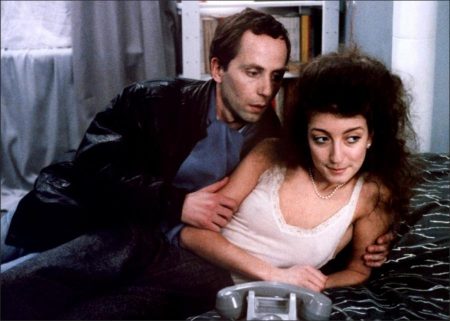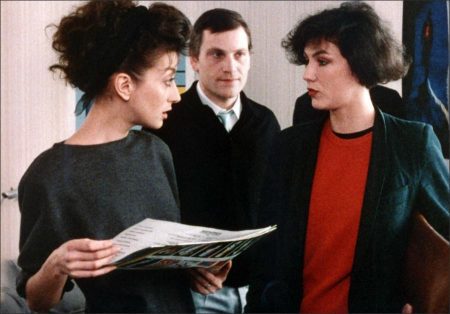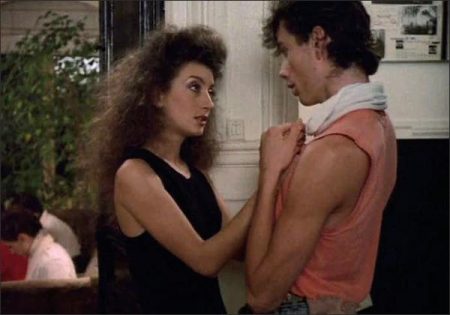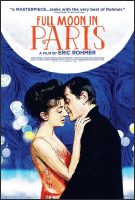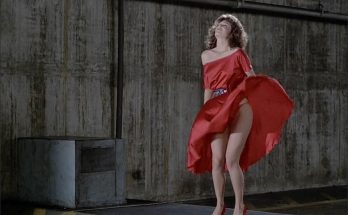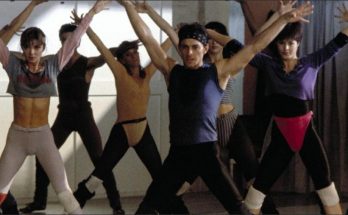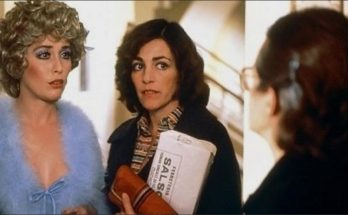Full Moon in Paris movie storyline. Trainee designer Louise lives with her boyfriend, Rémi, in the outskirts of Paris. Whilst Rémi wants to get married, Louise is reluctant to let go of her freedom, and so she starts to spend part of her time in her apartment in the center of Paris, believing this will strengthen their relationship. Things do not go quite as planned however. Bored with her new solitary life in Paris, Louise sees more of her writer friend, Octave, and to starts to flirt with a young musician, Bastien.
Full Moon in Paris (French: Les Nuits de la pleine lune) is a 1984 French film directed and written by Éric Rohmer. The film stars Pascale Ogier, Tchéky Karyo and Fabrice Luchini. The score is by Elli et Jacno. Full Moon in Paris was Rohmer’s fourth installment in his Comedies and Proverbs series. The story opens with the proverb “Qui a deux femmes perd son âme, qui a deux maisons perd sa raison” (“He who has two women loses his soul. He who has two houses loses his mind.”)
A young woman looks for the true meaning of love and learns the truth of the old saw, “You don’t know what you’ve got until it’s gone,” in this fourth installment in Eric Rohmer’s Comedies and Proverbs series. The story opens with the proverb, “He who has two women loses his soul. He who has two houses loses his mind,” and centers on Louise (Pascale Ogier) and her live-in lover, Remi (Tchéky Karyo), a Paris architect and noted tennis player.
Review for Full Moon in Paris
Éric Rohmer’s fourth comedy and proverb, Full Moon in Paris, opens with a proverb that Rohmer invented himself: “The one who has two wives loses his soul; the one who has two houses loses his mind.” In execution, this assertion is presented via the educated, yet flaky and pretentious Louise (Pascale Ogier) as she present an argument for added independence to her older boyfriend Remi (Tchéky Karyo). While he’s concerned about their increased time apart, she’s certain that the key to happiness lies in maximizing one’s own pleasure. And, unfortunately for Remi, her pleasure lies in going out to clubs alone and renting a flat in Paris, away from their suburban home, to sleep at on occasion.
Louise also maintains a somewhat unhealthy friendship with her married friend Octave (Fabrice Luchini). From him, she gets the validation and desire she craves, indulging his strained affectations while refuting his amorous advances. It’s a transparent and narcissistic relationship that affords both of them the luxury of justifying their inherent selfishness.
Like many of Rohmer’s films, Full Moon intimately explores the psychology of a flawed ideology. Louise, though certain of herself, is constantly met with unexpected conundrums that challenge her youthful ideals. While keeping Remi at a distance seems perfectly acceptable to her — overestimating his loyalty — she’s confronted by things beyond her control, things that eventually force her to recognize the inherent folly in indulging in an ersatz Byronic lifestyle.
As noted in the supporting booklet included with this Blu-ray release and the interview snippet with Ogier after winning Best Actress at the Venice Film Festival, this was a collaborative effort; Rohmer wrote a premise that was re-written after the actors had time rehearse their roles and play out different scenes. Most of the scenes were filmed with only one or two takes, as the script was partially improvised by the characters these actors had strongly influenced. And though Rohmer made a career out of exploring complicated and flawed people with a basic literary sensibility — he’s been quoted comparing film to literature several times — he struggled to contain his vision and avoid becoming discursive.
Full Moon, though occasionally indulgent and protracted, evaded these potentially tangential trappings, but despite having coherent themes about the basic folly of living entirely for the self, there’s something fleeting and alienating about this deceptively supercilious comedy. In part, it’s that the characters are all grotesque French caricatures, barfing up introductory philosophy and indirectly thumbing their noses at the perceived bourgeois.
Even more frustrating is the superficiality of it all; even though the characters are carefully considered and their trajectories are entirely logical, Rohmer’s refusal to provide any external perspective or contextualize the vulgarity of these people makes Full Moon often difficult to watch. Arguably, Rohmer is giving the audience some room to explore their own intelligence, having more wisdom than the idiots they see on screen, but the lack of framing or gaze leaves us only with the experience of watching assholes repeatedly refuse to acknowledge their own awfulness.
However, as an exercise in restrained, observational filmmaking, this acclaimed comedy does excel overall. The lack of judgment and lack of forced perspective style respects the audience enough to allow them to draw their own moral conclusions, which is a rarity within the lexicon of cinema.
Full Moon in Paris (1984)
Directed by: Éric Rohmer
Starring: Pascale Ogier, Tchéky Karyo, Fabrice Luchini, Virginie Thévenet, Christian Vadim, László Szabó, Lisa Garneri, Anne-Séverine Liotard
Screenplay by: Éric Rohmer
Production Design by: Pascale Ogier
Cinematography by: Renato Berta
Film Editing by: Cécile Decugis
Costume Design by: Pascale Ogier
Makeup Department: Geneviève Peyralade
Music by: Jacno, Elli Medeiros
Distributed by: Orion Classics
Release Date: September 7, 1984
Visits: 203
